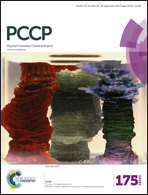A new perspective on the electron transfer: recovering the Butler–Volmer equation in non-equilibrium thermodynamics
Abstract
Electron transfer reactions are commonly described by the phenomenological Butler–Volmer equation which has its origin in kinetic theories. The Butler–Volmer equation relates interfacial reaction rates to bulk quantities like the electrostatic potential and electrolyte concentrations. Although the general structure of the equation is well accepted, for modern electrochemical systems like batteries and fuel cells there is still intensive discussion about the specific dependencies of the coefficients. A general guideline for the derivation of Butler–Volmer type equations is missing in the literature. We derive very general relations of Butler–Volmer structure which are based on a rigorous non-equilibrium thermodynamic model and allow for adaption to a wide variety of electrochemical systems. We discuss the application of the new thermodynamic approach to different scenarios like the classical electron transfer reactions at metal electrodes and the intercalation process in lithium–iron–phosphate electrodes. Furthermore we show that under appropriate conditions also adsorption processes can lead to Butler–Volmer equations. We illustrate the application of our theory by a strongly simplified example of electroplating.


 Please wait while we load your content...
Please wait while we load your content...